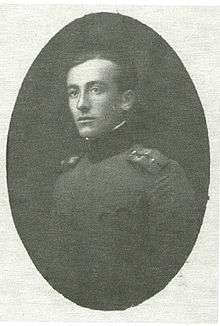Hasan Kikić
| Hasan Kikić | |
|---|---|
 | |
| Born |
20 August 1905 Gradačac, Bosnia Eyalet, Ottoman Empire |
| Died |
6 May 1942 (aged 36) Mt. Čemernica, Bosnia and Herzegovina, Yugoslavia |
| Ethnicity | Bosniak[1] |
| Alma mater | University of Belgrade (1937) |
| Spouse | Anka Jovanović (1932–42; his death)[2] |
| Children | Zlatko (son; born 1937) |
Hasan Kikić (20 August 1905 – 6 May 1942) was a Bosnian Muslim literate and poet.
Kikić co-founded the journal Putokaz (Signpost) with Skender Kulenović and Safet Krupić, in the wake of the cultural and political emancipation of the Bosnian Muslims.[3][4] The journal was published from 1937 until 1939.
He became a victim of World War II at age 36 when he was killed by Serb Chetniks.
Personal life
Kikić was born into an impoverished bey house, one of seven sons of Haso Kikić and Munira (née Đulbegović).[5] His father fought in World War I for the Austro-Hungarian Empire by the Italian river Piave.
While working in Rogatica from 1928–32, Kikić met teacher Anka Jovanović, who would become his wife.[6] Anka, a Christian, was from a respectable bourgeois family from Rogatica. The love between Muslims and Christians at the time was considered scandalous. Their families were not supportive of the marriage. Hasan and Anka shunned both families and relocated to the Croatian village Sjeničak in Kordun near Gvozd.
After two years of teaching Kikić become the school governor, and in 1936 was transferred to Pisarovina, where the couple remained for four years.
World War II
As a captain of the Yugoslav Partisans, Kikić was sent to Sanski Most. His wife Anka stayed in Zagreb with their son Zlatko. Kikić's friend Skender Kulenović had settled in Skender Vakuf during the war. Kulenović recalled that Kikić would often visit him from his post on Mount Čemernica. In May 1942, Kikić arrived on horseback for a short visit and was killed in a Chetnik ambush while traveling back to Čemernica.[7]
Kikić and a traveling companion, a teenage messenger, were on horseback near the village Rapta on Mt. Čemernica when three Chetnik peasants with rifles emerged out of the forest. The boy saw Kikić fall off his horse, but heard no gunshot. When the boy saw the men running in their direction, it became clear that Kikić had been shot. He ran into the forest, where he witnessed Kikić crawling on the road, writhing in pain. The Chetniks fired several more rounds. When they realized that Kikić was a Bosnian Muslim, they beat him to death.[8]
Bibliography
- Provincija u pozadini (1935)
- Ho-ruk (1936)
- Šta se dogadja u Španiji (1937)
- Bukve (1938)
References
- ↑ "Tekst i analiza: istraživanja". Google Books. 2004. Retrieved 31 March 2016.
- ↑ "RODNA KUĆA KNJIŽEVNIKA HASANA KIKIĆA". Historija Gradacac. 4 October 2012. Retrieved 31 March 2016.
- ↑ "Bošnjačke i bosanske književne neminovnosti". Google Books. 2003. Retrieved 31 March 2016.
- ↑ "Godišnjak Odjeljenja za književnost". Google Books. 1974. Retrieved 31 March 2016.
- ↑ "Hasan Kikić, književnik i revolucionar: Zaštitnik obespravljenih". Nezavisne. 25 November 2007. Retrieved 31 March 2016.
- ↑ "Provincija u pozadini". Radio Sarajevo. Retrieved 31 March 2016.
- ↑ "Hasan Kikić, jedna evropska nepoznanica". Balcani Caucaso. 18 June 2014. Retrieved 31 March 2016.
- ↑ "Kako je poginuo Hasan Kikić". Behar. 31 January 2014. Retrieved 31 March 2016.